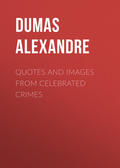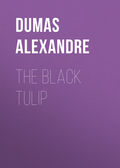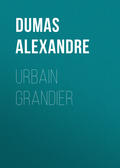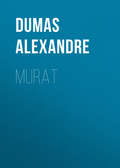
Александр Дюма
The Companions of Jehu
Montbar passed through the villages of Varennes, La Crèche, and Chapelle-de-Guinchay, and did not stop until he reached the Maison-Blanche. The spot was exactly as Valensolle had described it, and was admirably adapted for an ambuscade.
The Maison-Blanche stood in a tiny valley between a sharp declivity and a rise in the ground. A little rivulet without a name flowed past the corner of the garden and made its way to the Saône just above Challe. Tall bushy trees followed the course of the little stream, and described a half-circle, inclosing the house on three sides. The house itself was formerly an inn which proved unproductive to the innkeeper. It had been closed for seven or eight years, and was beginning to fall into decay. Before reaching it, the main road coming from Mâcon made a sharp turn.
Montbar examined the locality with the care of an engineer choosing his ground for a battlefield. He drew a pencil and a note-book from his pocket and made an accurate plan of the position. Then he returned to Mâcon.
Two hours later his groom departed, carrying the plan to Morgan, having informed his master that Antoine was the name of the postilion who was to take the coach from Mâcon to Belleville. The groom also gave him the four screw-rings and the two padlocks he had purchased.
Montbar ordered up a bottle of old Burgundy, and sent for Antoine.
Ten minutes later Antoine appeared. He was a fine, handsome fellow, twenty-five or six years of age, about Montbar’s height; a fact which the latter, in looking him over from head to foot, remarked with satisfaction. The postilion paused at the threshold, and, carrying his hand to his hat in a military salute, he said: “Did the citizen send for me?”
“Are you the man they call Antoine?” asked Montbar.
“At your service, and that of your company.”
“Well, you can serve me, friend. But close the door and come here.”
Antoine closed the door, came within two steps of Montbar, saluted again, and said: “Ready, master.”
“In the first place,” said Montbar, “if you have no objections, we’ll drink a glass of wine to the health of your mistress.”
“Oh! oh! My mistress!” cried Antoine. “Can fellows like me afford mistresses? They’re all very well for gentlemen such as you.”
“Come, you scamp!” said Montbar. “You can’t make me believe that, with your make-up, you’ve made a vow of chastity.”
“Oh! I don’t say I’m a monk in that particular. I may have a bit of a love-affair here and there along the high-road.”
“Yes, at every tavern; and that’s why we stop so often with our return horses to drink a drop or fill a pipe.”
“Confound it!” said Antoine, with an indescribable twist of the shoulders. “A fellow must have his fun.”
“Well, taste the wine, my lad. I’ll warrant it won’t make you weep.” And filling a glass, Montbar signed to the postilion to fill the other.
“A fine honor for me! To your health and that of your company!”
This was an habitual phrase of the worthy postilion, a sort of extension of politeness which did not need the presence of others to justify it in his eyes.
“Ha!” said he, after drinking and smacking his lips, “there’s vintage for you – and I have gulped it down at a swallow as if it were heel-taps!”
“That was a mistake, Antoine.”
“Yes, it was a mistake.”
“Luckily,” said Montbar, refilling his glass, “you can repair it.”
“No higher than my thumb, citizen,” said the facetious postilion, taking care that his thumb touched the rim of the glass.
“One minute,” said Montbar, just as Antoine was putting his glass to his lips.
“Just in time,” said the postilion; “it was on its way. What is it?”
“You wouldn’t let me drink to the health of your mistress, but I hope you won’t refuse to drink to mine.”
“Oh! that’s never refused, especially with such wine. To the health of your mistress and her company.”
Thereupon citizen Antoine swallowed the crimson liquor, tasting and relishing it this time.
“Hey!” exclaimed Montbar, “you’re in too much of a hurry, my friend.”
“Pooh!” retorted the postilion.
“Yes. Suppose I have several mistresses. If I don’t name the one we drink to what good will it do her?”
“Why, that’s true!”
“Sad; but you’ll have to try again, my friend.”
“Ha! Try again, of course! Can’t do things half-way with a man like you. The sin’s committed; we’ll drink again.” And Antoine held out his glass. Montbar filled it to the brim.
“Now,” said Antoine, eying the bottle, and making sure it was empty, “there must be no mistake. Her name?”
“To the beautiful Josephine!” said Montbar.
“To the beautiful Josephine!” repeated Antoine.
And he swallowed the Burgundy with increasing satisfaction. Then, after drinking, and wiping his lips on his sleeve, he said, as he set the glass on the table: “Hey! one moment, citizen.”
“What now?” exclaimed Montbar. “Anything wrong this time?”
“I should say so. We’ve made a great blunder but it’s too late now.”
“Why so?”
“The bottle is empty.”
“That one, yes; but not this one.”
So saying, Montbar took from the chimney corner another bottle, already uncorked.
“Ah! ah!” exclaimed Antoine, a radiant smile lighting his face.
“Is there any remedy for it?” asked Montbar.
“There is,” replied Antoine, holding out his glass.
Montbar filled it as scrupulously full as he had the first three.
“Well,” said the postilion, holding the ruby liquid to the light and admiring its sparkle, “as I was saying, we drank to the health of the beautiful Josephine – ”
“Yes,” said Montbar.
“But,” said Antoine, “there are a devilish lot of Josephines in France.”
“True. How many do you suppose there are, Antoine?”
“Perhaps a hundred thousand.”
“Granted. What then?”
“Well, out of that hundred thousand a tenth of them must be beautiful.”
“That’s a good many.”
“Say a twentieth.”
“All right.”
“That makes five thousand.”
“The devil! You’re strong in arithmetic!”
“I’m the son of a schoolmaster.”
“Well?”
“Well, to which of those five thousand did we drink, hey?”
“You’re right, Antoine. The family name must follow. To the beautiful Josephine – ”
“Stop. This glass was begun; it won’t do. If the health is to do her any good, we’ll have to empty it and fill it again.”
He put the glass to his lips.
“There, it’s empty,” he said.
“And full,” added Montbar, putting the bottle to the glass.
“I’m ready. To the beautiful Josephine – ”
“To the beautiful Josephine – Lollier!”
And Montbar emptied his glass.
“By the Lord!” exclaimed Antoine. “Wait a moment. Josephine Lollier! Why, I know her.”
“I didn’t say you didn’t.”
“Josephine Lollier! Why, she’s the daughter of the man who keeps the post-horses at Belleville.”
“Exactly.”
“Damn it!” exclaimed the postilion, “you’re not to be pitied – a pretty slip of a girl! To the health of beautiful Josephine Lollier.”
And he swallowed his fifth glass of Burgundy.
“Now,” asked Montbar, “do you understand why I had you sent up here, my lad?”
“No; but I don’t bear you any grudge for it, all the same.”
“That’s very kind of you.”
“Oh! I’m a pretty good devil.”
“Well, I’ll tell you why I sent for you.”
“I’m all ears.”
“Wait. You’ll hear better if your glass is full than if it’s empty.”
“Are you a doctor for deaf folk?” asked the postilion, banteringly.
“No; but I’ve lived a good deal among drunkards,” replied Montbar, filling Antoine’s glass again.
“A man is not a drunkard because he likes wine,” said Antoine.
“I agree with you, my good fellow,” replied Montbar. “A man is only a drunkard when he can’t carry his liquor.”
“Well said,” cried Antoine, who seemed to carry his pretty well. “I’m listening.”
“You told me that you didn’t understand why I had sent for you.”
“That’s what I said.”
“Still, you must have suspected that I had an object?”
“Every man has an object, good or bad, according to our priest,” observed Antoine, sententiously.
“Well, my friend,” resumed Montbar, “mine is to make my way by night, without being recognized, into the courtyard of Master Nicolas-Denis Lollier, postmaster at Belleville.”
“At Belleville,” repeated Antoine, who had followed Montbar’s words with all the attention he was capable of. “You wish to make your way by night, without being recognized, into the courtyard of Master Nicolas-Denis Lollier, postmaster at Belleville, in order to see the beautiful Josephine? Ah, ha! my sly dog!”
“You have it, my dear Antoine; and I wish to get in without being recognized, because Father Lollier has discovered everything, and has forbidden his daughter to see me.”
“You don’t say so. Well, what can I do about it?”
“Your wits are still muddled, Antoine. Drink another glass of wine to brighten them up.”
“Right you are,” exclaimed Antoine.
And he swallowed his sixth glass of wine.
“You ask what you can do, Antoine?”
“Yes, what can I do? That’s what I ask.”
“Everything, my friend.”
“I?”
“You.”
“Ha! I’m curious to know what. Clear it up, clear it up!” And he held out his glass.
“You drive the mail to Chambéry to-morrow, don’t you?”
“Yes; at six o’clock.”
“Well, suppose that Antoine is a good fellow?”
“No supposing about it; he is!”
“Well, this is what Antoine does – ”
“Go on; what does he do?”
“In the first place, he empties his glass.”
“Done! that’s not difficult.”
“Then he takes these ten louis.”
Montbar spread ten louis on the table.
“Ah, ha!” exclaimed Antoine, “yellow boys, real ones. I thought those little devils had all emigrated.”
“You see there are some left.”
“And what is Antoine to do to put them in his pocket?”
“Antoine must lend me his best postilion’s suit.”
“To you?”
“And let me take his place to-morrow night.”
“Ah, yes; so that you can see the beautiful Josephine to-morrow night.”
“Of course. I reach Belleville at eight, drive into the courtyard, and say the horses are tired and must rest from eight till ten, and from eight to ten – ”
“You can fool Père Lollier.”
“Well, there you are, Antoine!”
“There I am! When a fellow’s young he goes with the young ‘uns; when he’s a bachelor he’s in with the bachelors; when he’s old and a papa, he can go with the papas, and cry, ‘Long live the papas.’”
“Then, my good Antoine, you’ll lend me your best jacket and breeches?”
“I’ve just got a new jacket and breeches that I’ve never worn.”
“And you’ll let me take your place?”
“With pleasure.”
“Then I’ll give you five louis for earnest money.”
“And the rest?”
“Tomorrow, when I pull on the boots; only – there’s one precaution you must take.”
“What is it?”
“There’s talk of brigands robbing diligences; you’ll be careful to put the holsters on the saddle.”
“What for?”
“For pistols.”
“No, no! Don’t you go and shoot those fine young fellows.”
“What! do you call robbers who pillage diligences fine young men?”
“A man’s not a robber because he takes government money.”
“Is that your opinion?”
“I should say so; besides, it’s the opinion of a good many other people, too. As for me, if I were a judge, I’d never in the world condemn them.”
“Perhaps you would drink to their health?”
“Of course, if the wine was good.”
“I dare you to do it,” said Montbar, emptying the last of the second bottle into Antoine’s glass.
“You know the proverb?” said the postilion.
“What is it?”
“Never defy a fool to commit his folly. To the health of the Companions of Jehu.”
“Amen!” responded Montbar.
“And the five louis?” asked Antoine, putting his glass on the table.
“There they are.”
“Thank you; you shall have the holsters on your saddle; but take my advice and don’t put pistols in ‘em; or if you do, follow Père Jérôme’s example – he’s the conductor of the Geneva diligence – and put powder and no balls in ‘em.”
And with that philanthropic advice, the postilion took his leave, and went down the stairway singing a postilion’s song in a vinous voice.
Montbar followed the song conscientiously through two verses, then, as the voice died away in the distance, he was obliged to forego the rest of the song, however interesting he may have found it.
CHAPTER XLII. THE CHAMBÉRY MAIL-COACH
The next day, at five in the afternoon, Antoine, anxious, no doubt, not to be late, was in the courtyard of the Hôtel de la Poste, harnessing the three horses which were to relay the mail-coach.
Shortly after, the coach rumbled into the courtyard at a gallop, and was pulled up under the windows of a room close to the servants’ stairway, which had seemed greatly to occupy Antoine’s attention. If any one had paid attention to so slight a detail it might have been observed that the window-curtain was somewhat imprudently drawn aside to permit the occupant of the room to see the persons who got out of the coach. There were three men, who, with the haste of famished travellers, made their way toward the brilliantly lighted windows of the common room.
They had scarcely entered, when a smart postilion came down the kitchen staircase, shod simply with thin pumps over which he intended to pull his heavy riding-boots, These he received from Antoine, slipping five louis into his hand at the same time, and turned for the man to throw his riding cape over his shoulders, a protection rendered necessary by the severity of the weather.
This completed, Antoine returned hastily to the stables and hid in the darkest corner. As for the man who had taken his place, reassured no doubt by the high collar of the cape that concealed half of his face, he went straight to the horses which stood ready harnessed, slipped his pistols into the holsters, and, profitting by the moment when the other horses were being led into the stable by their postilion, he took a gimlet, which might in case of need serve as a dagger, from his pocket, and screwed the four rings into the woodwork of the coach, one into each door, and the other two into the body of the coach. After which he put the horses to with a rapidity and skill which bespoke in him a man familiar from childhood with all the details of an art pushed to extremes in our day by that honorable class of society which we call “gentlemen riders.”
That done, he waited, quieting his restless horses by voice and whip, judiciously combined, or used in turn.
Everyone knows the rapidity with which the meals of the unhappy beings condemned to travel by mail are hurried through. The half-hour was not up, when the voice of the conductor was heard, calling:
“Come, citizen travellers, take your places.”
Montbar placed himself close to the carriage door and recognized Roland and the colonel of the 7th Chasseurs, perfectly, in spite of their disguise, as they jumped into the coach, paying no attention whatever to the postilion.
The latter closed the door upon them, slipped the padlock through the two rings and turned the key. Then, walking around the coach, he pretended to drop his whip before the other door, and, in stooping for it, slipped the second padlock through the rings, deftly turned the key as he straightened up, and, assured that the two officers were securely locked in, he sprang upon his horse, grumbling at the conductor who had left him to do his work. In fact the conductor was still squabbling with the landlord over his bill when the third traveller got into his place in the coupé.
“Are you coming this evening, to-night, or to-morrow morning, Père François?” cried the pretended postilion, imitating Antoine as best he could.
“All right, all right, I’m coming,” answered the conductor; then, looking around him: “Why, where are the travellers?” he asked.
“Here,” replied the two officers from the interior and the agent from the coupé.
“Is the door properly closed?” persisted Père François.
“I’ll answer for that,” said Montbar.
“Then off you go, baggage!” cried the conductor, as he climbed into the coupé and closed the door behind him.
The postilion did not wait to be told twice; he started his horses, digging his spurs into the belly of the one he rode and lashing the others vigorously. The mail-coach dashed forward at a gallop.
Montbar drove as if he had never done anything else in his life; as he crossed the town the windows rattled and the houses shook; never did real postilion crack his whip with greater science.
As he left Mâcon he saw a little troop of horse; they were the twelve chasseurs told off to follow the coach without seeming to escort it. The colonel passed his head through the window and made a sign to the sergeant who commanded them.
Montbar did not seem to notice anything; but after going some four or five hundred yards, he turned his head, while executing a symphony with his whip, and saw that the escort had started.
“Wait, my babes!” said Montbar, “I’ll make you see the country.” And he dug in his spurs and brought down his whip. The horses seemed to have wings, and the coach flew over the cobblestones like the chariot of thunder rumbling past. The conductor became alarmed.
“Hey, Master Antoine,” cried he, “are you drunk?”
“Drunk? fine drinking!” replied Montbar; “I dined on a beetroot salad.”
“Damn him! If he goes like that,” cried Roland, thrusting his head through the window, “the escort can’t keep up.”
“You hear what he says!” shrieked the conductor.
“No,” replied Montbar, “I don’t.”
“Well, he says that if you keep this up the escort can’t follow.”
“Is there an escort?” asked Montbar.
“Of course; we’re carrying government money.”
“That’s different; you ought to have said so at first.”
But instead of slacking his pace the coach was whirled along as before; if there was any change, it was for greater velocity than before.
“Antoine, if there’s an accident, I’ll shoot you through the head,” shouted the conductor.
“Run along!” exclaimed Montbar; “everybody knows those pistols haven’t any balls in them.”
“Possibly not; but mine have!” cried the police agent.
“That remains to be seen,” replied Montbar, keeping on his way at the same pace without heed to these remonstrances.
On they went with the speed of lightning through the village of Varennes, then through that of La Crêche and the little town of Chapelle-de-Guinchay; only half a mile further and they would reach the Maison-Blanche. The horses were dripping, and tossed the foam from their mouths as they neighed with excitement.
Montbar glanced behind him; more than a mile back the sparks were flying from the escort’s horses. Before him was the mountainous declivity. Down it he dashed, gathering the reins to master his horses when the time came.
The conductor had ceased expostulating, for he saw that the hand which guided the horses was firm and capable. But from time to time the colonel thrust his head through the window to look for his men.
Half-way down the slope Montbar had his horses under control, without, however, seeming to check their course. Then he began to sing, at the top of his voice, the “Réveil du Peuple,” the song of the royalists, just as the “Marseillaise” was the song of the Jacobins.
“What’s that rogue about?” cried Roland, putting his head through the window. “Tell him to hold his tongue, conductor, or I’ll put a ball through his loins.”
Perhaps the conductor might have repeated Roland’s threat to Montbar, but he suddenly saw a black line blocking the road. “Halt, conductor!” thundered a voice the next moment.
“Postilion, drive over the bellies of those bandits!” shouted the police agent.
“Drive on yourself!” said Montbar. “Do you suppose I’m going over the stomachs of friends? Who-o-ah!”
The mail coach stopped as if by magic.
“Go on! go on!” cried Roland and the colonel, aware that the escort was too far behind to help them.
“Ha! You villain of a postilion,” cried the police agent, springing out of the coupé, and pointing his pistol at Montbar, “you shall pay for this.”
The words were scarcely uttered when Montbar, forestalling him, fired, and the agent rolled, mortally wounded, under the wheels of the coach. His fingers, convulsed by death, touched the trigger and the pistol went off, but the ball touched no one.
“Conductor,” shouted the two officers, “by all the powers of heaven, open, open, open quickly!”
“Gentlemen,” said Morgan, advancing, “we are not attacking your persons, we merely want the government money. Conductor! that fifty thousand francs, and quickly too!”
Two shots from the interior made answer for the officers, who, after vainly shaking the doors, were still more fruitlessly attempting to force themselves through the windows. No doubt one of their shots took effect, for a cry of rage was heard and a flash illuminated the road. The colonel gave a sigh, and fell back against Roland. He was killed outright.
Roland fired again, but no one replied to him. His pistols were both discharged; locked in as he was he could not use his sabre, and he howled with rage.
Meantime the conductor was forced, with a pistol at his throat, to give up the money. Two men took the bags containing the fifty thousand francs, and fastened them on Montbar’s horse, which his groom had brought ready saddled and bridled, as if to a meet. Montbar kicked off his heavy boots and sprang into the saddle.
“My compliments to the First Consul, Monsieur de Montrevel!” cried Morgan. Then, turning to his companions, he cried: “Scatter which way you will, you know the rendezvous for to-morrow night.”
“Yes, yes,” replied ten or a dozen voices.
And the band dispersed like a flock of birds, disappearing down the valley into the shadow of the trees that lined the banks of the little river and surrounded the Maison-Blanche.
At that moment the gallop of horses was heard, and the escort, alarmed by the pistol shots, appeared on the crest of the hill and came down the slope like an avalanche. But it came too late; it found only the conductor sitting dazed by the roadside, the bodies of the colonel and of Fouché’s agent, and Roland a prisoner, roaring like a lion gnawing at the bars of its cage.






